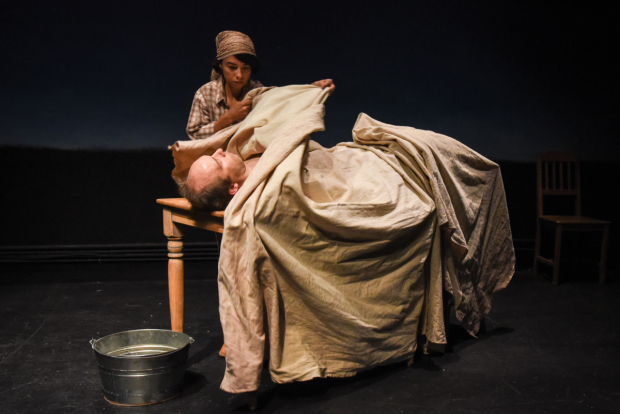Unity (1918)

(© Russ Rowland)
In 1918, a worldwide flu pandemic infected nearly a third of the world's population. Anywhere from 30-50 million people died, most of whom were young-to-middle-aged adults. Kevin Kerr's Unity (1918), now making its U.S. debut at The Gene Frankel Theatre under the production of Project: Theater, takes this catastrophic (and now largely forgotten) event as its inspiration. It's a fascinating look at biological disaster, filtered through an unfailingly polite (if somewhat sleepy) Canadian lens.
Unity won Canada's Governor General's Award for Drama for its 2001 premiere. With instances of deadly Legionnaires' disease currently on the rise in The Bronx, this play's arrival in the city seems ghoulishly timely. Rather than penning a sweeping depiction of the flu's global scale, Kerr makes the pandemic devastatingly personal by presenting its impact on the tiny town of Unity, Saskatchewan.
Twenty-one-year-old Beatrice Wilde (Jessi Blue Gormezano) serves as our narrator, framing the action with her detailed diary entries. Canadian soldiers are returning home from the war, including Hart (Joe Jung), who was blinded by mustard gas. Farmer Stan (Joshua Everett Johnson) takes his wife, who died during childbirth, to Icelandic undertaker Sunna (Beth Ann Hopkins). None of them anticipate that this is just the first of many deaths. Beatrice's younger sister, Sissy (Alexandra Perlwitz), thinks it's the end of the world. Most people, however, don't have time for such explanations. They're too busy surviving.
The nine-person ensemble gives an authentic portrayal of small-town life in the early part of the last century. Hopkins is captivating as Unity's resident immigrant loner/angel of death. Jung gives a multilayered performance as a mild-mannered returned soldier, trying his best to keep the horrors of war out of his thoughts. As gossipy telephone operators Doris and Rose, Melanie Rey and Wendy Bagger deliver much-needed comic relief in this downer of a play. They're the ultimate source of information in the town, offering medical advice and pressing news with equal expertise. Everyone speaks with solid Canadian prairie dialects (with the exception of Sunna, who sounds like a dour Bjork).
Director KJ Sanchez stages the story with a touch that is both light and earthy. Scenes bleed into one another, but the time and place are never in question. Joe Jung's sound design (almost all of which is produced live using unlikely material like old matchboxes, chains in buckets, and a thin sheet of metal) brings a spine-tingling immediacy to the proceedings that is often lacking in the staid text.
In terms of action and excitement, Outbreak this is not (so you may want to coffee-up beforehand), but it does give an honest sense of the humanity and civility of real people as they're struggling to understand and overcome a disaster largely beyond their control.
"I'm trying to help win the war," Beatrice says as she cares for the sick and dying, more to reassure herself than anything. But unlike war, which can be explained and fought, infectious disease knows no political purpose or ideology. It is so terrifying because its violence is completely indiscriminate. If our recent collective panic about Ebola is any indication, this has not changed in the last century. Unity is not only a thoughtful work of historical fiction, but a shrewd depiction of human behavior in the midst of the plague.











